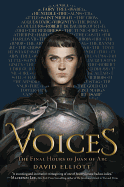
Voices, David Elliott's second young adult novel in verse (Bull), uses concrete poetry and a variety of poetic forms--villanelles, sestinas, ballades, triolets--to tell a fictionalized account of Joan of Arc's last hours. Joan herself speaks often, walking the reader through her short life and how she came to be imprisoned: "Every life has its own story--/ not without a share of glory,/ and not without a share of grief./ I lived like a hero at seventeen./ At nineteen, I die like a thief." Also included are direct quotes from Joan's 1431 Trial of Condemnation and the 1455 Trial of Nullification, to give "the real Joan and her associates the opportunity to speak for themselves." These "associates"--her parents, Charles VII, Bishop Pierre Cauchon and more--are given their own poetic monologues. But others tell their tales, too: Saint Margaret, the warhorse Joan rode, the tower in which she was imprisoned, the stake that held her to the ground... even the fire. The fire, unlike the other characters, speaks directly to Joan throughout. It lusts after her, growing in ferocity and size, each appearance a longer poem than the one before: "I burn I burn I burn my darling/ I burn I burn I burn/ I yearn I yearn I yearn my darling/ I yearn I yearn I yearn."
Powerful and fierce, Voices focuses on and revels in the base impulses and overwhelming gynophobia that led to the martyring of the Maid of Orléans. The virginal Joan and her death are sexualized in such a way that there is an abiding sense of wrongness in addition to the enduring dread. The reading experience is unsettling yet entrancing, and likely to acquire many fans. --Siân Gaetano, children's and YA editor, Shelf Awareness

